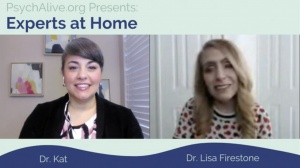Building Self-Esteem
 Millions of people suffer from low self-esteem. They walk around each day questioning themselves. They wonder if they are attractive enough, smart enough, successful enough. They constantly worry about what other people think of them, when the truth is that they are their own harshest critics.
Millions of people suffer from low self-esteem. They walk around each day questioning themselves. They wonder if they are attractive enough, smart enough, successful enough. They constantly worry about what other people think of them, when the truth is that they are their own harshest critics.
Self-esteem is defined as having “confidence in one’s own worth or abilities.” While this type of confidence can be an important aspect of leading a happy and successful life, it is important to distinguish between heathy and unhealthy forms of self-esteem.
In the 1980s, psychotherapist Nathaniel Brandon argued that having high self-esteem was the key to leading a successful life. The “Self-Esteem Movement” was born and parents did their best to instill copious amounts of self-belief and confidence in their young children. In the process, children were often overpraised. They were told that everything they did was great and made to feel that they were special. This type of overpraising, according to Dr. Lisa Firestone, leads to feelings of both inadequacy and entitlement. (Not a winning combination.)
In many ways, our society’s focus on high self-esteem has become problematic. Dr. Kristen Neff explains that the problem with focusing on self-esteem is that it often involves measuring oneself against others, rather than paying attention to one’s intrinsic value. This fits with the research findings that when self-esteem is based on external sources it can have consequences on one’s mental health.
At PsychAlive, we often focus on the importance of self-worth over self-esteem. Nevertheless, there are healthy ways to go about building self-esteem.
Healthy Steps to Building Self-Esteem
- Stop Comparing Yourself to Others
Theodore Roosevelt was right when he said, “Comparison is the thief of joy.” Looking to boost your self-esteem by comparing yourself to others is ultimately going to lead to disappointment. Dr. Neff explains,
“Our competitive culture tells us we need to be special and above average to feel good about ourselves, but we can’t all be above average at the same time…There is always someone richer, more attractive, or successful than we are. And even when we do manage to feel self-esteem for one golden moment, we can’t hold on to it. Our sense of self-worth bounces around like a ping-pong ball, rising and falling in lock-step with our latest success or failure.”The first step to building healthy self-esteem is to simply stop comparing yourself to others. Spend less time worrying about how you measure up to the people around you. Instead, think about the kind of person you want to be and take actions consistent with your core values.
- Stop Listening to Your Inner Critic
Often, the biggest obstacle to building self-esteem is your critical inner voice. The critical inner voice is like a nasty coach that lives inside your head. It nags you with an endless stream of negative thoughts about yourself and others. It’s this inner critic that goes around comparing you to others and evaluating your every move with thoughts like…
“You’re not as attractive as him/her.”
“She’s/He’s way more intelligent than you.”
“Every time you speak up, you make a fool of yourself.”
“No one respects you. You’ll never get that promotion.”Furthermore, the inner critic often attacks the very essence of who you are. It may tell you things like “You’re worthless,” “You’re not like other people,” or “You’re a burden to the people you love.” These thoughts have a negative effect on one’s self-esteem and can even lead to self-destructive actions.The good news is that it is entirely possible to challenge your inner critic. On PsychAlive, we have an entire section of articles, several Webinars and an eCourse devoted to this subject. To begin with, it helps to recognize when you are having these kinds of negative thoughts about yourself. Then, you can decide not listen to your inner critic’s bad advice. You can challenge your inner critic by writing down your self-attacks on one side of a piece of paper and then writing a more realistic and compassionate evaluation of yourself on the other side. For example, if you write a self-attack like “You’re such an idiot,” you could then write, “I may struggle at times, but I am smart and competent in many ways.”
The process of challenging your inner critic allows you to see yourself for who you really are, which provides a healthy foundation for building real self-esteem.
- Practice Self-Compassion
Self-compassion is the practice of treating yourself like a friend, and it is a great way to build more confidence and contentment in yourself. In fact, Dr. Neff’s research has shown that, in many ways, self-compassion is more beneficial to one’s psychological well-being than self-esteem. Self-compassion is not based on self-evaluation or judgment, rather it is based on a consistent attitude of kindness and acceptance toward yourself.Being kind and compassionate to yourself may not come easily at first, however it is possible to develop more self-compassion through practice. According to Dr. Neff, there are three components to practicing self-compassion:
1) Acknowledge and notice your suffering.
2) Be kind and caring in response to suffering.
3) Remember that imperfection is part of the human experience and something we all share.You can find self-compassion exercises on Dr. Kristen Neff’s website.
- Focus on Helping Others
Helping others can provide a huge boost to your self-esteem. Studies show that generosity offers tremendous benefits to both physical and mental health. According to Dr. Lisa Firestone, “Generosity is a natural confidence builder and a natural repellent of self-hatred. Not only does it make us feel better about ourselves, but it actively combats feelings of isolation and depression.”Another benefit of generosity is that it requires us to shift our focus off of ourselves. Dr. Firestone explains that we often focus on ourselves in negative ways, filtering our self-perceptions through the unflattering lens of the critical inner voice. When we focus on helping others, we begin to look outward in ways that broaden our horizons. Furthermore, we begin to see ourselves reflected positively through interactions with others.
- Live Up to Your Own Moral Code
In order to develop healthy and consistent feelings of self-esteem, it is important to respect yourself. Acting on your own principles is an essential part of this equation. A study at the University of Michigan found that students “who based their self-esteem on internal sources–such as being a virtuous person or adhering to moral standards–were found to receive higher grades and less likely to use alcohol and drugs or to develop eating disorders.” Robert Firestone suggests that you always “make a concerted effort to maintain personal integrity in your life by insisting that your actions correspond to your words.” If eating healthy or looking your best are important to you, for instance, it is important to maintain a healthy lifestyle. Otherwise, you’ll be more vulnerable to attacks from your critical inner voice and less likely to respect yourself. Think about what your core principles are and try to act in line with those beliefs.
- Do Something Meaningful
Participating in activities that are meaningful to you is another way to build self-esteem. For example, studies show that volunteering has a positive effect on how people feel about themselves. What each person finds meaningful is entirely unique to them; it could be volunteering at an animal shelter, participating in local politics, making art with friends, hiking in the woods, or hosting a family dinner. Think about the activities and interests that you find meaningful and make sure to prioritize those things.Researcher Jennifer Crocker suggests that you find “a goal that is bigger than the self.” As Dr. Robert Firestonesays, “Investing energy in transcendent goals and activities that extend beyond one’s self interest, for example, contributing to a humanitarian cause or trying, in some way, to improve the lot of future generations, helps build self-esteem.”










Leave a Reply